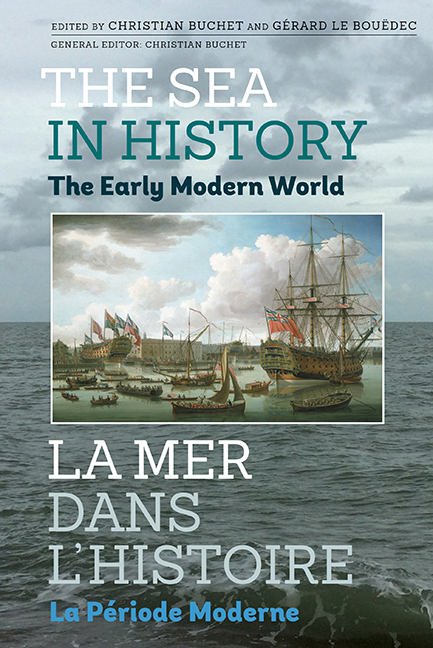Book contents
- Frontmatter
- Contents
- List of Illustrations
- List of Contributors
- Introduction générale et remerciements par
- General introduction and acknowledgements
- Introduction (français)
- Introduction (English)
- LA RÉUSSITE PAR LA MER:La reussite par la mer des territoires et des communautés littorales
- La construction d'un espace mondial: La circulation maritime et les ports
- La forte croissance de l'économie des pêches et des échanges
- Les acteurs de la dynamique maritime
- LA PUISSANCE MARITIME INSTRUMENT DE LA PUISSANCE POLITIQUE ET D'UNE STRATÉGIE GLOBALE DE RAYONNEMENT VOIRE DE DOMINATION: Les puissances maritimes occidentales
- L'océan Indien, entre convoitises et indifférences
- Les puissances maritimes asiatiques
- L'Afrique
- La politique maritime et l'idéologie
- Mer et développement technologique
- Développement maritime et maîtrise économique et financière
- Développement maritime et maîtrise organisationnelle
- Les gens de mer et l'Etat: la mobilisation navale en Europe
- The necessity and consequences of internationalisation: maritime work in the Dutch Republic in the 17th and 18th centuries
- The professionalisation of the English navy and its administration, 1660–1750
- L'état espagnol et le commerce colonial
- The Peruvian Viceroyalty and the Pacific
- The control of landing operations
- Conclusion (français)
- Conclusion (English)
- Conclusion générale par
- General conclusion by
- Miscellaneous Endmatter
- Miscellaneous Endmatter
The professionalisation of the English navy and its administration, 1660–1750
from Développement maritime et maîtrise organisationnelle
Published online by Cambridge University Press: 11 May 2017
- Frontmatter
- Contents
- List of Illustrations
- List of Contributors
- Introduction générale et remerciements par
- General introduction and acknowledgements
- Introduction (français)
- Introduction (English)
- LA RÉUSSITE PAR LA MER:La reussite par la mer des territoires et des communautés littorales
- La construction d'un espace mondial: La circulation maritime et les ports
- La forte croissance de l'économie des pêches et des échanges
- Les acteurs de la dynamique maritime
- LA PUISSANCE MARITIME INSTRUMENT DE LA PUISSANCE POLITIQUE ET D'UNE STRATÉGIE GLOBALE DE RAYONNEMENT VOIRE DE DOMINATION: Les puissances maritimes occidentales
- L'océan Indien, entre convoitises et indifférences
- Les puissances maritimes asiatiques
- L'Afrique
- La politique maritime et l'idéologie
- Mer et développement technologique
- Développement maritime et maîtrise économique et financière
- Développement maritime et maîtrise organisationnelle
- Les gens de mer et l'Etat: la mobilisation navale en Europe
- The necessity and consequences of internationalisation: maritime work in the Dutch Republic in the 17th and 18th centuries
- The professionalisation of the English navy and its administration, 1660–1750
- L'état espagnol et le commerce colonial
- The Peruvian Viceroyalty and the Pacific
- The control of landing operations
- Conclusion (français)
- Conclusion (English)
- Conclusion générale par
- General conclusion by
- Miscellaneous Endmatter
- Miscellaneous Endmatter
Summary
ABSTRACT. Upon the restoration of King Charles II in 1660 the English navy inherited from the Commonwealth navy a commitment to protect trade and models of practical administration and social leveling. The former called for active service in peace as well as war; the latter contributed to efficiency and competence. Charles II's personal desire to build up a strong navy furthered the development of its professionalisation. A notable feature was the role of flag officers and captains in upholding professional standards and administrative efficiency. The Board of Admiralty's authority was paramount but it was shared with the sea officers.
RÉSUMÉ. Après la restauration du Charles II en 1660, la marine anglaise a hérité de la marine du Commonwealth un engagement à protéger le commerce et des modèles d'administration pratiques et de nivellement social. Le premier appelle à un service actif en temps de paix comme en temps de guerre ; le second permet l'efficacité et la compétence. La volonté personnelle de Charles II de bâtir une marine forte a favorisé le développement de sa professionnalisation dont une des characteriques notables est le rôle des officiers et des capitaines de pavillon qui ont su faire respecter les normes professionnelles et l'efficacité administrative. L'autorité de l'Amirauté est primordiale, mais elle est partagée avec les officiers de marine.
In the 1680s Samuel Pepys remarked that the French navy was better administered than the English in ‘many points of importance to the well-governing of our Navy wherein the methods and establishments of France exceed ours’. He then listed thirteen of them. They were mainly concerned with arrangements for regular payment and sensible and fair treatment of seamen and officers.
Pepys observed all this with the eyes of a naval administrator – the most famous naval administrator in history. He probably knew that the actual performance of the French navy did not equal the quality of its administrative arrangements. It was a young service, suddenly risen since 1661 under the guidance of Jean- Baptiste Colbert after having fallen into complete decay during the preceding two or three decades.
- Type
- Chapter
- Information
- The Sea in History - The Early Modern World , pp. 852 - 866Publisher: Boydell & BrewerPrint publication year: 2017



